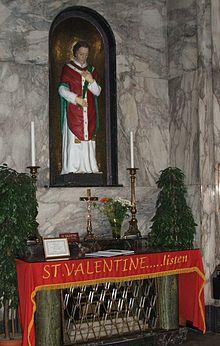
Shrine of St. Valentine in Whitefriar Street Carmelite Church in Dublin, Ireland
There are many stories about the origin of St Valentine, just as there are significant uncertainties about who he was, or how many St Valentines ever lived. No matter, St Valentine’s Day is now an important worldwide cultural event. And because the name starts with ‘St’, and the festivals started from the Church, is it also an important ‘Christian’ festival ? This article from our archives explores St Valentine.
Who was St Valentine?
All the stories agree that there are many St Valentines. According to Catholic Church sources like Catholic Online, there are at least three martyred St Valentines recognized by the Roman Catholic Church:
The most popular St Valentine appears to be a priest in Rome, who assisted the martyrs in the persecution under Claudius II. He was arrested, and sent by the emperor to the prefect of Rome, who, on finding all his promises to make him renounce his faith ineffectual, commanded him to be beaten with clubs. Afterwards, he was executed by beheading on February 14, about the year 270.
Then there was Bishop Valentine who was born and lived in Interamna. He was imprisoned and tortured in Rome on February 14, 273, while on a temporary stay there. His body was buried in a hurry at a nearby cemetery and a few nights later his disciples came and carried him home.
The third Valentine is said to be a saint who suffered on the same day (February 14) with a number of companions in the Roman province of Africa, for whom nothing else is known.
Equally legendary are the tales associated with these personalities.
What qualifies them (or him) for ‘Sainthood’?
Just as historians are uncertain about which Valentine is celebrated on February 14, there is also some confusion about what was done by which St Valentine. According to some sources, he was venerated because of his martyrdom on account of assisting persecuted Christians.
In another story, he defied the emperor’s edict that young men should not be married, in order to make them more suitable for warfare. St Valentine, in spite of the edict, continued to conduct wedding ceremonies for young people in secret. For this, he was imprisoned and martyred.
Let’s look at the Catholic Online again: “Another legend is that Valentine refused to sacrifice to pagan gods. Being imprisoned for this, Valentine gave his testimony in prison and through his prayers healed the jailer’s daughter who was suffering from blindness. On the day of his execution he left her a note that was signed ‘Your Valentine’ The first Valentine card, so to speak.
So we may never know for sure what St Valentine did. The Church too is not very certain. Certainly, there is no mention of this ‘saint’ or his acts in the Bible. The feast of St. Valentine of February 14 was first established in 496 by Pope Gelasius I, who included Valentine among all those “… whose names are justly reverenced among men, but whose acts are known only to God.” According to Wikipaedia, in the 1969 revision of the Roman Catholic Calendar of Saints, the feast day of Saint Valentine on February 14 was removed from the General Roman Calendar and relegated to particular (local or even national) calendars for the following reason: “apart from his name, nothing is known of Saint Valentine except that he was buried on the Via Flaminia on February 14”. The Anglican Church, Lutheran church and some other Christian denominations also have official commemorations for St. Valentine’s Day.
Corrupting the Halo
It is an uncomfortable co-incidence that St Valentine?s Day falls between February 13 and 15, same period during which the ancient Romans observed Lupercalia, an archaic rite connected to fertility. Lupercalia was a festival local to the city of Rome. The more general Festival of Juno Februa, meaning “Juno the purifier “or “the chaste Juno”, was celebrated on February 13-14. This coincidence has led many to assert that St Valentine’s Day was merely a religious whitewash of those pagan festivals by the early Popes. During this festival, according to History Channel (http://www.history.com/):
“members of the Luperci, an order of Roman priests, would gather at a sacred cave where the infants Romulus and Remus, the founders of Rome, were believed to have been cared for by a she-wolf or lupa. The priests would sacrifice a goat, for fertility, and a dog, for purification. They would then strip the goat’s hide into strips, dip them into the sacrificial blood and take to the streets, gently slapping both women and crop fields with the goat hide. Far from being fearful, Roman women welcomed the touch of the hides because it was believed to make them more fertile in the coming year. Later in the day, according to legend, all the young women in the city would place their names in a big urn. The city’s bachelors would each choose a name and become paired for the year with his chosen woman. These matches often ended in marriage. Lupercalia survived the initial rise of Christianity and but was outlawed – as it was deemed un-Christian – at the end of the 5th century, when Pope Gelasius declared February 14 St. Valentine’s Day.
However, St Valentine’s Day did not start as a day of debauchery. This came hundreds of years later, fueled by commerce and corruption. According to the Catholic Online, “Many of the current legends that characterise Saint Valentine were invented in the fourteenth century in England, notably by Geoffrey Chaucer and his circle, when the feast day of February 14 first became associated with romantic love”.
Today, nothing is left of the godly Old St. Valentine. His ‘day’ has been turned to a day of lust, debauchery and unbridled pairing that will make the members of the ancient order Luperci green with envy. Pope Gelasiu, and Valentine himself, must be wondering at what has become of St Valentine’s Day!
What is the Church to Do?
In Church service today (February 8), the Minister announced that there will be a Valentine event on February 14 for the youth. Like in Rome of old, we actually picked names (by ballot) of the people we should bring gifts for. Thankfully, there will be no pairing for the year! The church has been trying to recover the essence of the message of St Valentine’s Day, Agape Love, and create a wholesome alternative for its youth by organising alternative Valentine Events.
To my mind, however, contesting the meaning of St Valentine’s Day with the World is not worth the effort. The World, aided by commerce, mass communication and man’s fallen nature, determines how Valentine’s Day is celebrated today. Organizing holy valentine programs is merely playing second fiddle. It means that we fundamentally agree with the concept, with minor modifications. By so doing, we strengthen the World in its mission. Our ‘holy valentines’ will keep making concessions to the more flesh-friendly worldly editions and prepare our children for its reception.
I doubt if God would adopt this strategy. To start with, the counsel establishing the sainthood of St Valentine or the day attributed to him is debatable. It is instructive that the Catholic Church has deemed it fit, in its 1969 revision of Calendar of Saints, to remove it from the General Roman Calendar. The Church of England removed it at a time, but re-inserted it in their 1661/1662 Book of Common Prayer. God did not start it, the Church is hesitant about it, and the World has taken it over and turned it to a day of debauchery, so why do we try to make it relevant?
So now we refurbish the day, and plaster it with Christian themes, but does that make it appealing to God? Would God not consider our Valentine Day exertions “strange vanities”? Would God not ask us again, like he asked ancient Israel in Jeremiah 8:19: “Why have they provoked me to anger with their graven images, and with strange vanities?” If God ever hated anything, the modern St Valentine’s Day will be one of them. If that is the case, no amount of white-washing will make Him change His mind. When He hates something – He does not participate or condone it. “I hate, I despise your feast days, and I will not smell in your solemn assemblies. Though ye offer me burnt offerings and your meat offerings, I will not accept them: neither will I regard the peace offerings of your fat beasts.“(Amo 5:21-22)
Love, as spelt out in 1 Corinthians Chapter 13 is certainly important in the Church and a principal duty of Christians, but I believe we do not need a special day to practice it. It is a daily duty: to God and our fellow humans.





